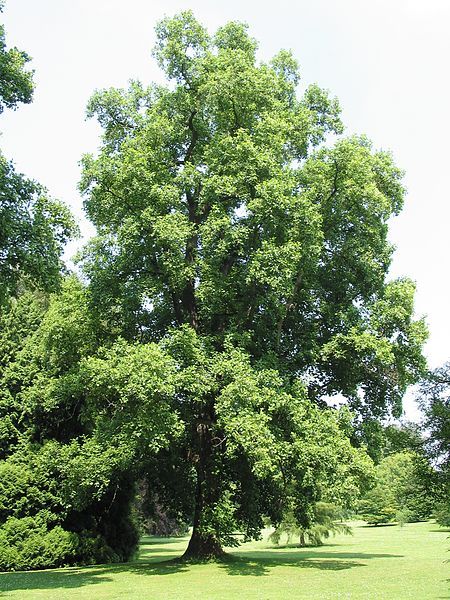-
 Hyperion
Hyperion
-
 Glabella
Glabella
-
 Nucleolinus
Nucleolinus
-
 Spica
Spica
-
 Endosome
Endosome
-
 Bacteriophage
Bacteriophage
-
 Faraday constant
Faraday constant
-
 Twilight
Twilight
-
 Necrophagous
Necrophagous
-
 IANA
IANA
-
 Neurochip
Neurochip
-
 Protrusion
Protrusion
-
 Kumquat
Kumquat
-
 Aminoglycoside
Aminoglycoside
-
 Thermal insulation
Thermal insulation
-
 Endergonic
Endergonic
-
 Craton
Craton
-
 Teflon
Teflon
-
 ECC
ECC
-
 POP
POP
-
 Tau
Tau
-
 Gangue
Gangue
-
 Shank feathers
Shank feathers
-
 Port
Port
-
 Myoglobin
Myoglobin
-
 Broadband network
Broadband network
-
 Caulinary
Caulinary
-
 Isomerism
Isomerism
-
 Replication
Replication
-
 Gravity
Gravity
Tulip tree
The tulip tree is a tree between 30 to 35 metres tall of which the foliage is particularly splendid in autumn: the colour of its large leaves turns from dark green to yellow as soon as the weather gets colder.

Liriodendron tulipifera. © Kenpei, Creative Commons Attribution-Share Alike 3.0 Unported license
Names
The tulip tree (Liriodendron tulipifera) belongs to the Magnoliaceae family. It is called a tulip tree because its leaves and flowers look like tulips.
Botanical description
The bark of this species is smooth when the tree is young, and then develops vertical furrows as it ages. Its deciduous leaves are almost as wide as they are long (8 to 15 centimetres) and hang on the end of a long petiole. The leaves have four lobes, and thus look like tulips when seen from the front.

Tulip tree flower (Liriodendron tulipifera) - Laeken Park (Belgium). © Jean-Pol Grandmont, Creative Commons Attribution 3.0 Unported license
Its flowers only appear after several years. Greenish and orange, also tulip-shaped, they bloom in May and June. Their free carpels transform into winged dry fruit, like raised light brown cones that mature in autumn.
Origins
This tree comes from the United States, and more specifically Virginia. It was introduced in Versailles in 1771, on the request of Queen Marie-Antoinette. This historic specimen was unfortunately felled by the storm that wreaked havoc in France in 1999.
Growing conditions
The tulip tree prefers well-drained soil, with a light texture, such as sandy soil or slightly acidic silty soil. It does not grow in very humid places, or in places that are too dry.
Use
The wood of this tree, with a brownish-green core, is quite fragile and is used in sculpture.
Author: Michel Caron
 Meise (Belgium), Belgian National Botanic Garden - Liriodendron tulipifera - Tulip tree. © Jean-Pol Grandmont, Creative Commons Attribution-Share Alike 2.5 Generic license
Meise (Belgium), Belgian National Botanic Garden - Liriodendron tulipifera - Tulip tree. © Jean-Pol Grandmont, Creative Commons Attribution-Share Alike 2.5 Generic license
Latest
Fill out my online form.



